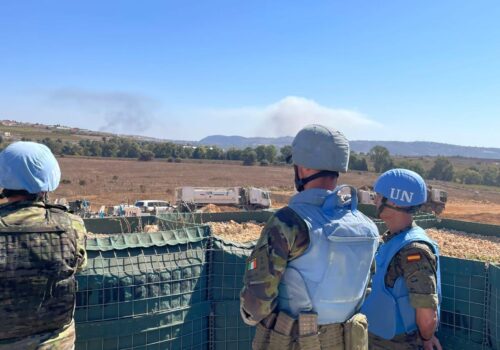Naim Qassem is finally the bride
Hezbollah has a new secretary-general, though far from the obvious choice. On October 29, the group announced that its demure and soft-spoken Naim Qassem, rumored to be hiding in Iran, had succeeded Hassan Nasrallah, who was assassinated on September 27, to Hezbollah’s top local post. Though entirely ideologically aligned, there is a vast contrast between the two men’s personalities and skillset, which could impact Hezbollah’s image and organizational effectiveness.
Qassem was born in 1953 in the village of Kfar Kila in south Lebanon. He became an early member of Hezbollah and one of its founders, joining the intellectual current that would later transform into the organization in 1979. However, his political career began earlier as a member of Imam Musa al-Sadr’s Amal Party, demonstrating a longstanding preference for the activist current within Shi’ism—if not the Khomeinist variant specifically. Qassem’s biography even claims that he helped Sadr found his activist Movement of the Dispossessed during the 1970s. During this time, he also pursued a Bachelor of Science in chemistry from Lebanese University – Hadath Campus (1971-1977) and his higher religious studies under Ayatollah Mohammad Hussein Fadlallah. Qassem was also politically active on campus, helping found the Lebanese Union of Muslim Students, a body that sought to encourage religious observance and disseminate Fadlallah’s teachings.
SIGN UP FOR THIS WEEK IN THE MIDEAST NEWSLETTER
While still a university student, he also assumed the leadership of the Association for Islamic Religious Education from 1974-1988, the umbrella organization that would later head Hezbollah’s Mustafa Schools system and maintain a supervisory role over the schools since then. After graduation, Qassem turned to pedagogy, working as a high school teacher for six years.
Qassem’s intellectual orientation dictated the course of his career in Hezbollah. The extent to which he engaged in any military activities during the organization’s early days—or if he has any military experience at all—remains unknown. Qassem instead made a name for himself as Hezbollah’s chief intellectual and the chief articulator of its ideology. He is a prolific author and has written over a dozen books that map Hezbollah’s ideology to religious and political topics.
His magnum opus is, perhaps, Hezbollah: Methodology, Experience, and Future, now several editions old and translated into English among six other languages, as well as Hezbollah: The Story from Within. This book recounts Hezbollah’s founding and history through the group’s particular ideological lens. Qassem also regularly gave long, intellectually-oriented interviews, primarily to Hezbollah’s media outlets, outlining the group’s beliefs and objectives. This contrasted with Nasrallah, who only periodically gave such long but heavily propaganda-laden interviews.
Qassem’s always held significant roles within Hezbollah. He is a member of the group’s Shura Council and oversees its parliamentary, political, and governmental activities. But he was never meant to be Nasrallah’s successor—a dubious honor earmarked for Nasrallah’s maternal cousin Hashem Safieddine. Saffiedine was recently confirmed to have been killed on October 4—and Hezbollah’s options have only been shrinking since then under continued Israeli military pressure. Qassem was instead Hezbollah’s perpetual bridesmaid—having been elected as deputy-secretary general on May 22, 1991, during Hezbollah’s second conclave, under then-Secretary-General Abbas al-Musawi. When the Israelis assassinated Musawi on February 16, 1992, Qassem maintained his post as the younger Nasrallah assumed the secretary-general role—and there he remained and was intended to remain. He also never publicly expressed a desire to assume his current position.
Hezbollah’s and Qassem’s claims notwithstanding, Israel’s rapid spate of assassinations has thrown the group’s chain of succession into disarray. After Saffiedine’s death, the lack of options thrust Qassem to the top of a very short list of Nasrallah’s potential successors.
Now heading Hezbollah, it remains an open question whether Qassem can effectively lead the multifaceted group. While he certainly possesses some organizational skills, they pale compared to Nasrallah’s or Saffiedine’s. While Qassem was penning books, both Nasrallah and Saffiedine presided over Hezbollah’s Executive Council, the body responsible for managing the group’s non-military activities, which act as its engine for recruitment and growth, prior to assuming the post of secretary-general. Qassem also seems to lack any understanding of military matters, having—as far as can be known—never fought in Hezbollah’s ranks like Nasrallah nor sat on its Jihad Council like Saffiedine. Now, the thinker is being asked to descend from his ivory tower to manage these complex functions during what is arguably Hezbollah’s most existential war to date.
There’s also a question of whether Qassem can fill the void left by Nasrallah’s cult of personality. Hassan Nasrallah became Hezbollah’s second secretary-general in 1993, when the organization was still relatively new, and led it for the bulk of its forty-two-year existence.
He was also a natural orator, a skill that helped him hold his audience’s attention and influence their feelings. His hand gestures, his status as a sayyed and alleged descent from the Islamic Prophet Mohammad, his proletarian turns of phrase, his ability to seamlessly transition from classical Arabic to south Lebanese village dialect, and even his letter “R” speech defect—all captured the affection of Hezbollah’s supporters. Even his name, “Nasrallah,” Divine Victory, added to the cultish hold of Hezbollah’s long-serving secretary-general. “Labayka Ya Qassem” (At Your Command, Qassem) simply doesn’t have the same ring to it—if it has any ring to it at all.
Nasrallah’s personality and longevity all left their imprint on Hezbollah’s “brand,” such that it is difficult to identify where the man ended and the organization began. Saffiedine possessed enough of his maternal cousin’s intangible traits to be an effective successor. But the cerebral, university-educated, Francophone, and, dare one say, worldly Qassem has none of that and none of Nasrallah’s populism, which so endeared him to the group’s base.
None of this suggests that Qassem is any less committed to Hezbollah’s ideology, worldview, or ultimate objectives than Nasrallah. He is an ardent proponent of Velayat-e Faqih, insisting in a series of 2016 interviews with Al-Mayadeen that Hezbollah—as Islamists, in his words—still aspires to convince Lebanese of all sects to adopt Iran’s theocratic system of government as the only way to establish a truly just society. He shares Nasrallah’s hatred of the “Great Satan,” the United States, believing it to be the chief purveyor of a decadent and corrupt “capitalist” cultural model inherently at odds with Hezbollah’s and Iran’s. Qassem also has an unyielding desire to see Israel destroyed and for Hezbollah to contribute to that destruction.
In short, Hezbollah will not moderate or shift its primary loyalties to Lebanon under its new soft-spoken secretary-general. However, Qassem’s cerebral nature may affect how Hezbollah pursues its ideological objectives, while his seeming lack of qualifications for the leadership position may make the organization less competent. Hezbollah’s lack of effective leadership could also see Iran’s Islamic Revolution step in to help resuscitate and manage Hezbollah, harking back to the group’s embryonic stages.But this whole discussion of Qassem’s leadership may end up being theoretical. Shortly after Qassem’s appointment, Israeli Defense Minister Yoav Galant threatened “Temporary appointment—the countdown [to the new secretary-general’s assassination] has begun.” Considering the fate of Qassem’s predecessors, this may be no idle threat.
David Daoud is a senior fellow at the Foundation for Defense of Democracies (FDD), focusing on Hezbollah, Israel, and Lebanon issues. Follow him on X: @DavidADaoud.
Further reading
Wed, Oct 9, 2024
The countdown to Nasrallah’s assassination began with Majdal Shams
MENASource By David Daoud
Hezbollah Secretary-General Hassan Nasrallah signed his death warrant on July 27.
Wed, Oct 30, 2024
Inside Israeli politics and public opinion with a pollster
MENASource By Stefanie Hausheer Ali
A Tel Aviv-based public opinion researcher and political advisor was interviewed to discuss how Israelis view Prime Minister Benjamin Netanyahu, the ongoing conflict, and the future.
Tue, Oct 22, 2024
Israel versus Hezbollah: Not a full-scale war—yet
MENASource By Nicholas Blanford
The Israeli army appears to have absorbed some of the lessons of its troubled 2006 experience fighting against Hezbollah.
Image: Lebanon’s Hezbollah new leader Sheikh Naim Qassem delivers a speech from an unknown location, October 30, 2024 in this still image from video. REUTERS TV/Al Manar TV via REUTERS



